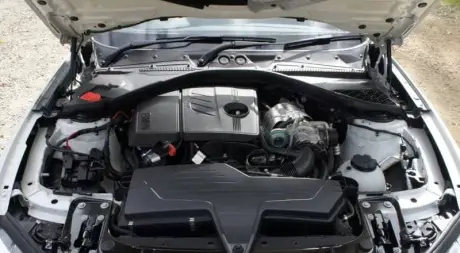
The BMW 1 Series has a reputation for engine problems. Specifically, the 116i and 120d engines are most often affected, but others also exhibit a tendency towards engine damage. The primary issues are with the timing chain and faulty oil pumps, causing many vehicles to fail before reaching 62,000 miles.
The 1 Series features various engine types, with the three-cylinder gasoline engines and turbocharged diesel engines being the most susceptible. This article delves deeper into the problems associated with these engines and the most cost-effective remedies.
Signs of Engine Damage in the BMW 1 Series
An early indicator of engine damage in the 1 Series is a loose timing chain. Although this doesn't necessarily indicate imminent engine damage, it can quickly escalate. This issue manifests as a rattling noise from the engine compartment, particularly noticeable during cold starts.
If the engine check light illuminates, there's a high chance the timing chain has streched. This can also result in engine damage, as the chain can easily slip off, causing the same problems as a broken chain.

If the chain has already snapped or slipped, engine damage is inevitable. In such cases, stop immediately and shut off the engine, as continuing to drive will exacerbate the damage. Afterward, the engine will not restart, and you're facing significant engine damage. Timing chain issues are not new to BMW engines. More information on BMW timing chain problems can be found with us.
The oil indicator light coming on might predict a malfunctioning oil pressure pump. Given that this endangers the engine's entire lubrication system, immediately shut off your 1 Series engine.

Furthermore, be alert to any oil loss. While a faulty oil pump won't cause increased consumption, a rise indicates an existing engine defect. Significant oil loss can cause myriad problems, effectively ending the engine's life. Blue smoke from the exhaust also indicates oil in the combustion cycle.
Additional sounds from the engine, such as knocking or thudding, can also signal engine damage. While it's commonly the engine "knocking," signifying premature combustion, other damages can also cause these sounds.
For three-cylinder engines, like the 116i, consistently monitor the coolant level. These compact engines undergo intense thermal conditions, and a decrease in coolant often predicts engine damage.
For other general signs of engine damage, visit our page on popular complaints of BMW 1-Series.
Engine Damage in BMW 1 Series, What Now?
Engine Repair
Engine repair is usually the most economical solution when dealing with engine damage. However, it might not always be practical due to the extent of the damage. For instance, issues outside the engine, like a faulty turbocharger, can be fixed. Repairs can cost between $5,000 to $10,000.
If the problem is internal, such as within the combustion chamber, repairs are typically dismissed because of the time and multiple components involved.
Engine Replacement
Many workshops offer engine replacement.
Dealerships generally price this between $6,000 to $14,000. While online retailers can offer considerably lower prices, their quality can be questionable, and scams are harder to detect.
Given these factors, opting for a middle ground, such as an offer from an independent workshop, is usually the best approach.
Selling Your BMW with Engine Damage
Considering the costs of replacement engines, selling your 1 Series with engine damage might seem attractive at first. Here, your damaged 1 Series is sold to offset costs for a new vehicle.
The price range depends largely on the vehicle's mileage and overall condition.
Common Issues
As mentioned, 1 Series engines are notorious for timing chain problems. If the chain snaps or slips, the valves collide with the pistons, causing destruction. Moreover, metal shavings can disperse within the combustion chamber, scratching cylinder walls.
The aforementioned faulty oil pressure pump is another common issue. Either the pump itself is malfunctioning or its driving chain. In both scenarios, the engine isn't sufficiently lubricated, causing metallic parts to grind against each other, leading to extensive damage.
Overheating often plagues three-cylinder engines. Potential causes include damaged coolant hoses or head gasket leaks, resulting in coolant loss. Another reason might be a cracked cylinder head.

A fine crack in the cylinder head can allow both coolant and oil to enter the combustion chamber. Burning these fluids can cause damage, a shortage of the necessary fluid, and a loss of compression, thus reducing the vehicle's performance.
For vehicles prone to timing chain issues, consider a detailed examination of the chain and its tensioner during your next inspection. Regular maintenance is crucial to prevent timing chain damage. Mainly, focus on the chain's wear and potential elongation. Always be vigilant of the above-listed symptoms of timing chain damage and seek professional help immediately if they appear. It's also beneficial to be informed about models with a predisposition to such issues.
Preventing a crack in the cylinder head boils down to proper operation—always warm up and cool down your 1 Series. Before the engine reaches its operating temperature, avoid running it at very high or very low RPMs.

Additionally, monitor the oil level and inspect the oil pressure pump. If the oil level is low, track consumption to see if it remains within acceptable limits. If not, consult a workshop immediately.
Should the engine check light come on, promptly head to the nearest workshop.
Same articles

Understanding Vehicle Inspection and Verification Services: Why They Matter for Every Driver
GuidesVehicle inspection and verification services are an essential but often overlooked part of keeping roads safe and cars legally compliant. Most people only think about inspections when it’s...
KLIFEX Brand Overview: High-Quality Automotive Repair Kits for Affordable Repairs
GuidesThe automotive aftermarket has long needed solutions that combine reliability, durability, and affordability. Many car enthusiasts and services are looking for a way...
Fast, Reliable Vehicle Emissions & Inspection Services Made Simple
GuidesFast, reliable emissions and inspection services are essential for keeping vehicles road-ready, compliant with environmental regulations, and safe for daily driving. If you’re looking for quick...

